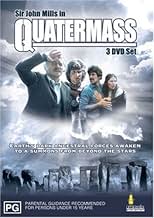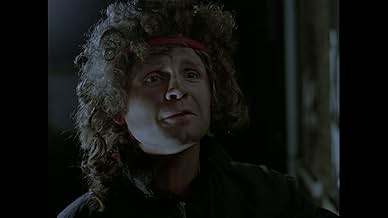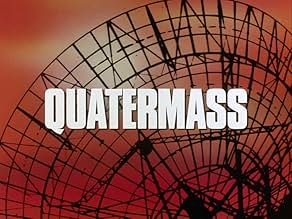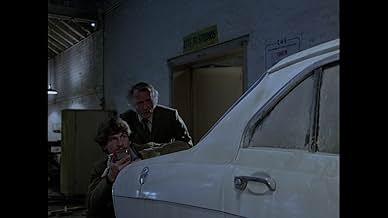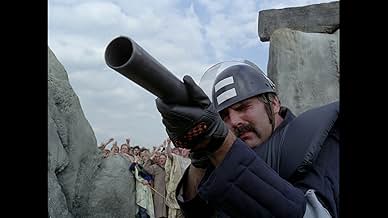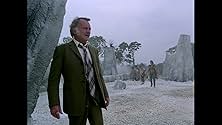In the distant future, a now-elderly Bernard Quatermass investigates the disappearance of his granddaughter and a mysterious cult.In the distant future, a now-elderly Bernard Quatermass investigates the disappearance of his granddaughter and a mysterious cult.In the distant future, a now-elderly Bernard Quatermass investigates the disappearance of his granddaughter and a mysterious cult.
Browse episodes
Featured reviews
"The Quatermass Conclusion" is one of the few 'true' pieces of science fiction ever committed to film and Nigel Neale's script rates up there with "2001" and "Dark Star" for inventiveness. Unfortunately it suffered from an obviously low budget and there are lapses here and there into melodrama. The story, set in a dystopian Britain, concerns the arrival of an unknown alien force which is 'harvesting' the youth by leading them to ancient ritual sites. Professor Quatermass (John Mills) comes out of retirement to look for his missing granddaughter and is drawn into the fight to save the planet's population. There are some disturbing images such as Wembley Stadium reduced to a 'killing ground' and the pensioners forced to live underground for safety. Many of the predictions in the film have since come about, such as the upsurge in 'hippy travellers' and the general social decay of the inner cities.
I remember seeing this broadcast. It was made by Euston Films so I was expecting th usual "Sweeney" type over-grain in the picture (1970's high speed 16mm), but instead it had the full gorgeous look of a motion picture, having been shot in 35mm with full motion picture negative (whereas most American productions were shot on 35mm television stock). The special effects where not all that good where the space shots were concerned - even by 1970's standards (to see good examples of these effects look at Space 1999 (1976 - 1978) whose Director of Effects, Brian Johnson, went on to win an Oscar just a couple of years later - for Alien). But the idea that a beam would come through space and consume vast number of people and turn them into a diaphanous web was effectively executed. It would be nice to see it again in its full version - perhaps the BBC could show it without breaks in two parts. Also it was an early appearance for Simon McQuorkindale (Manimal!).
This was Nigel Kneale's fourth and final Quatermass TV serial. The first three were also adapted into very good movies, this one wasn't, but it was edited down into a film, usually known as "The Quatermass Conclusion". I say avoid that and try and see this the full version, which goes for around 200 minutes. John Mills' Quatermass is very different from Andrew Keir's, Andre Morell's and most especially Brian Donlevy's Quatermass. Mills plays him as a tired and out of touch old man. The plot is set in the near future. Society has broken down, youth gangs roam the streets, while others known as "the planet people" wander the countryside. They are anti-science, anti-"progress" hippies who believe that they will one day be taken up and sent to another planet. I see some people criticise the planet people as being "out of date". These people seem to be unaware of the travellers/"crusties" phenomenon in Britain in the 1980s, and what about the "Heaven's Gate" cult of more recent years? Quatermass' granddaughter has run away from home, and while he searches for her he becomes involved with the planet people, a group of which seemingly are "taken" while congregating around some ancient standing stones. But this is only the beginning... to give away more of the plot would be a shame. The budget for this mini-series is obviously not all that large, and the special effects are modest, but they are generally pretty effective, the acting is good for the most part, and it contains an intelligence and darkness rarely seen in contemporary TV SF. 'Quatermass' has a few flaws but I think it is extremely underrated and a fine close to Kneale's Quatermass series.
I recently watched the complete four-hour version of Nigel Kneale's British miniseries "Quatermass." I had seen an edited movie version called "The Quatermass Conclusion" some years earlier. The verdict: The miniseries is superior. It expands on several subplots (of course) and offers richer characterizations. John Mills makes an excellent Quatermass--somewhat befuddled at the outset, but strong and clear of mind when the survival of the world is at stake. Granted, the production is not as polished as the movie version of "Quatermass and the Pit" (the music, in particular, sounds like it costs a couple of hundred bucks). But the ideas are intriguing and that darn nursery rhyme about Ringstone Round is still running around my brain. Kneale wrote a novelization of the miniseries that clarifies a few vague points.
I saw this series when first aired, when I was just a kid, and while I remembered little about the story, I did remember that it made more of an impression on me than most SF shows of the time. Now I can see why.
The setting is very much 'future 70s', with hippies, oil restrictions, social collapse, power cuts, and other fears of that era, the effects are certainly very old by modern standards, and Mills' Quatermass is too undeveloped and unsympathetic for my tastes. However, the story makes up for it, and there are some memorable ideas (like gladiatorial games in Wembley Stadium) and some memorable scenes (again, the Wembley Stadium 'harvesting' scene in particular, and the S&M 'family show' would also have been a lot more fun on Saturday night TV than Noel Edmonds).
One thing I hate about bad SF is that the aliens are just people with a few rubber bits stuck on their face, who come to Earth to kidnap women or steal our resources, or some other mundane and, frankly, very human goal. Quatermass' aliens, on the other hand, are never seen and we never even really find out quite what they're doing, just that they're extremely powerful and don't care about humans in the least... it's a far more intelligent premise, and very Lovecraftian, in a way.
So, the effects are dated, Quatermass himself could have done with more work and possibly a different actor, but overall it's an intelligent premise, and, frankly, the idea of an attack by hugely powerful aliens who care nothing for the human race is far more scary to me than most so-called 'horror' movies of recent years.
The setting is very much 'future 70s', with hippies, oil restrictions, social collapse, power cuts, and other fears of that era, the effects are certainly very old by modern standards, and Mills' Quatermass is too undeveloped and unsympathetic for my tastes. However, the story makes up for it, and there are some memorable ideas (like gladiatorial games in Wembley Stadium) and some memorable scenes (again, the Wembley Stadium 'harvesting' scene in particular, and the S&M 'family show' would also have been a lot more fun on Saturday night TV than Noel Edmonds).
One thing I hate about bad SF is that the aliens are just people with a few rubber bits stuck on their face, who come to Earth to kidnap women or steal our resources, or some other mundane and, frankly, very human goal. Quatermass' aliens, on the other hand, are never seen and we never even really find out quite what they're doing, just that they're extremely powerful and don't care about humans in the least... it's a far more intelligent premise, and very Lovecraftian, in a way.
So, the effects are dated, Quatermass himself could have done with more work and possibly a different actor, but overall it's an intelligent premise, and, frankly, the idea of an attack by hugely powerful aliens who care nothing for the human race is far more scary to me than most so-called 'horror' movies of recent years.
Did you know
- TriviaStarted life in 1973 as a BBC series called "Quatermass IV". It had been commissioned by Head of Drama Ronald Marsh, and according to Nigel Kneale, the intended producer was Joe Waters. Some model test sequences of the space station were shot, but eventually, the project was abandoned by the BBC. ITV then picked it up a few years later and produced it in association with Euston Films.
- Alternate versionsThis has been made available in the United States in two versions. It was first released edited down to a 105 minute feature film under the title The Quatermass Conclusion (1979). In 2003 the complete program was released on home video under the title "Quatermass" with a listed running time of 240 minutes.
- ConnectionsEdited into The Quatermass Conclusion (1979)
- How many seasons does Quatermass have?Powered by Alexa
Details
Contribute to this page
Suggest an edit or add missing content

